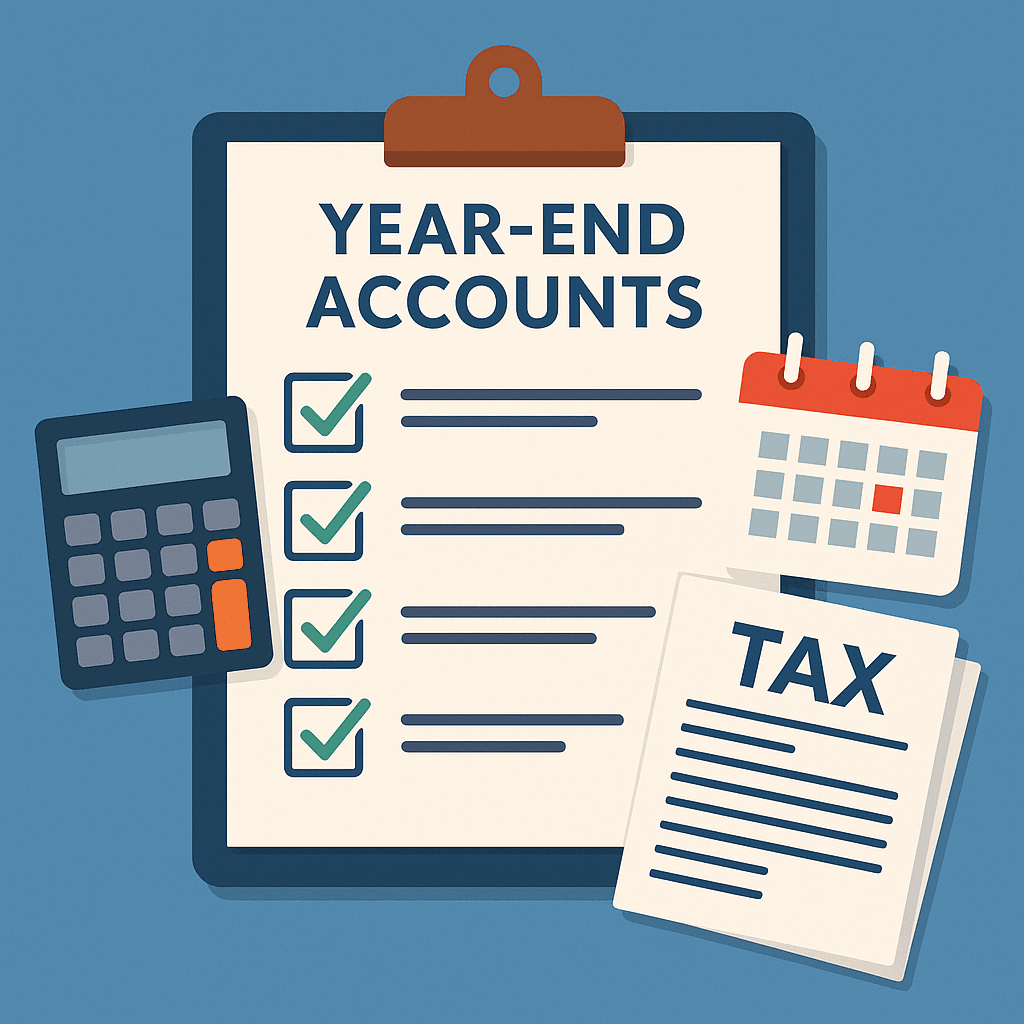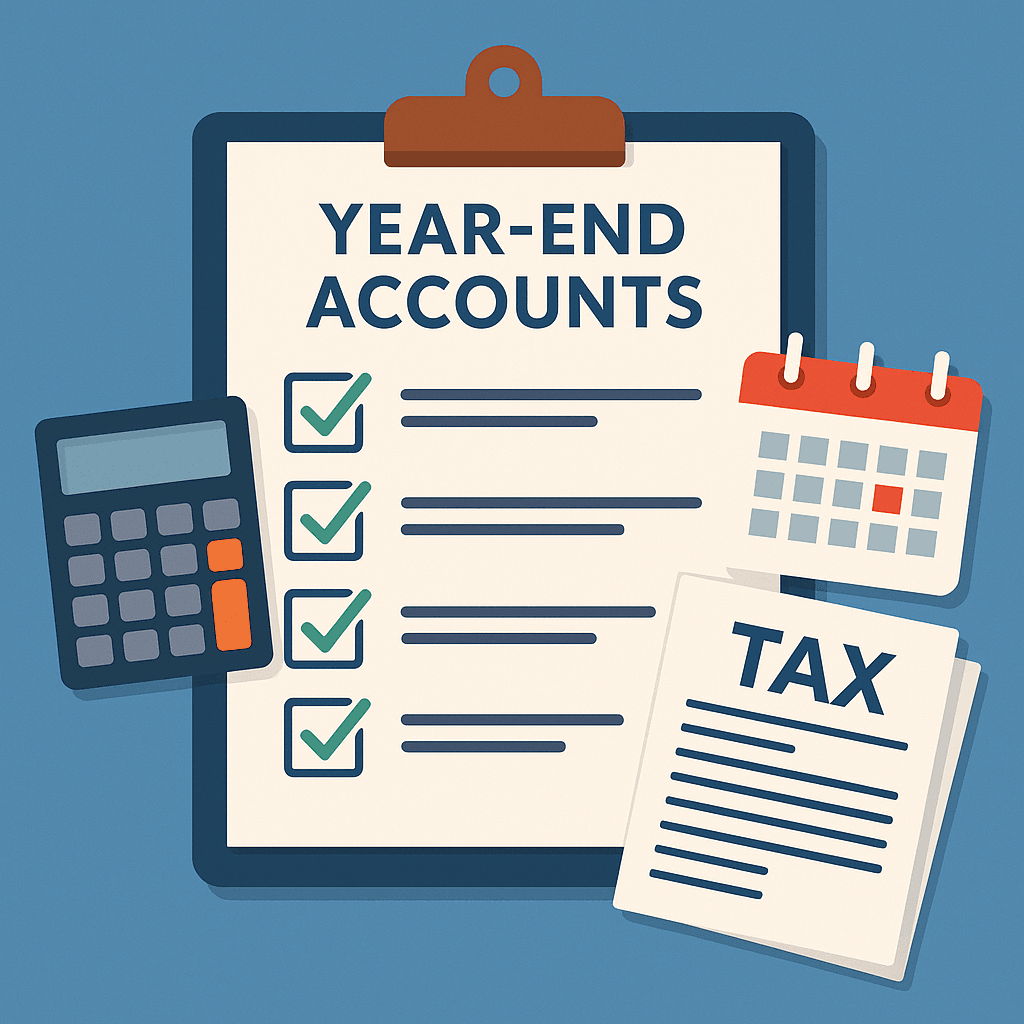For many business owners, year-end can feel chaotic: deadlines approach, paperwork piles up, and last-minute scrambles become the norm. But it doesn’t have to be that way. With the right preparation and a clear understanding of what HMRC expects, year-end can become a smooth, predictable process that supports healthier financial planning—not a stressful box-ticking exercise.
Whether you run a limited company, sole tradership, partnership, or small LTD with staff, preparing early helps you minimise tax, avoid penalties, and present a clear picture of your business performance. This smart guide breaks down year-end preparation into practical, manageable steps that keep your business one step ahead of HMRC, every time.
1. Start With Clean, Up-to-Date Books
One of the biggest mistakes small businesses make is waiting until the end of the financial year to sort out their bookkeeping. Inaccurate or incomplete records slow everything down and often lead to missed claims, errors, and unnecessary tax bills.
To stay ahead:
- Reconcile bank accounts monthly
- Categorise expenses correctly
- Ensure all invoices and receipts are logged
- Review outstanding customer payments
- Check supplier balances match statements
When your financial records are tidy, preparing accounts becomes far quicker—and far more accurate.
2. Review Your Profit, Loss, and Cash Flow Before Year-End
A proactive review of your financial performance offers huge strategic value. Don’t wait until after the year has closed; instead, sit down with your accountant to analyse key metrics while there’s still time to influence the outcome.
Questions to ask:
- Are we on track for a higher-than-expected profit (and tax bill)?
- Should we bring forward planned business purchases?
- Is it beneficial to delay income or accelerate expenses?
- Do we need to adjust dividends or directors’ salary before year-end?
Taking this step early helps ensure your tax bill is as efficient as possible.
3. Maximise Allowable Expenses and Reliefs
HMRC allows a wide range of legitimate costs to be offset against profits—but many small businesses miss out simply because they don’t know what can be claimed.
Examples include:
- Home office expenses
- Business mileage
- Professional subscriptions
- Staff training
- Software and digital tools
- Bad debt write-offs
- Capital allowances
Your accountant can help identify any missed opportunities, ensuring that no allowable cost is left off your books.
4. Understand and Plan for Corporation Tax or Income Tax
Businesses are often caught out by surprise tax bills—usually because they don’t plan ahead. HMRC penalties for late or incorrect filings can be avoided entirely with a proper timeline.
Key HMRC deadlines include:
- Corporation Tax payment: 9 months and 1 day after year-end
- Company Accounts filing: 9 months after year-end
- Self-Assessment deadline: 31 January each year
- Payroll reporting (RTI): ongoing
- VAT returns: every quarter
Preparing early means no unwelcome surprises and more time to spread the cost of your tax bill if needed.
5. Review Dividends and Directors’ Salary Strategy
For limited companies, balancing salary and dividends is a crucial part of tax-efficient planning. This should always be reviewed before year-end, not after.
You may need to adjust:
- Salaries paid through PAYE
- Dividends already issued
- Planned year-end distributions
- Employer’s National Insurance allowance
A quick review with an accountant can save hundreds—sometimes thousands—in unnecessary tax.
6. Check Your Payroll and Pension Responsibilities
If you employ staff, ensuring your payroll is accurate is essential before finalising year-end accounts. HMRC requires clean and up-to-date PAYE records.
This includes:
- Correct employee tax codes
- Updated starter and leaver information
- Processed overtime, bonuses, or holiday pay
- Ensuring workplace pension contributions are compliant
Payroll errors often lead to delays in filing Company Accounts, so reviewing early prevents headaches later.
7. Review Your Fixed Assets and Depreciation
Year-end is the ideal time to review machinery, computers, tools, furniture, and other assets. These may qualify for capital allowances such as Annual Investment Allowance (AIA) or Writing Down Allowances (WDA).
If your records aren’t updated regularly, you may be missing out on valuable tax relief.
8. Prepare for HMRC Digitisation Requirements
HMRC continues to roll out Making Tax Digital (MTD) across VAT, income tax, and eventually corporation tax. Businesses need to ensure:
- Their software is compliant
- Records are kept digitally
- VAT returns are submitted electronically
- Quarterly summaries may be required (depending on income band)
Modern cloud accounting (Xero, QuickBooks, FreeAgent) makes this far easier and reduces year-end stress dramatically.
9. Schedule a Pre Year-End Strategy Meeting With Your Accountant
Your accountant isn’t just there to file numbers—they can help you plan ahead, reduce tax, strengthen reporting, and grow more sustainably.
A pre year-end meeting helps you:
- Avoid mistakes
- Spot inefficiencies
- Identify tax opportunities
- Stay compliant
- Make better financial decisions
It’s one of the most valuable steps for a worry-free year-end.
10. Create a Year-End Checklist That Works for Your Business
Every business is different, so a tailored checklist ensures you don’t overlook anything important.
Great items to include are:
- Final bank reconciliation
- Review of profit/loss
- VAT checks
- Directors’ loan review
- Outstanding invoice follow-ups
- Payroll verification
- Asset listings
- Stocktake (if required)
- HMRC deadline calendar
With the right plan in place, year-end becomes predictable—not stressful.
Final Thoughts
Preparing for year-end doesn’t have to be overwhelming. With clean records, proactive planning, and the right professional support, UK businesses can stay fully compliant with HMRC while making smarter financial decisions. Year-end preparation is your chance to strengthen your business, improve efficiency, and start the next financial year on solid ground.
If you want help managing your accounts, planning ahead, or ensuring your filings are accurate and tax-efficient, DD Accounting is here to support you every step of the way.




